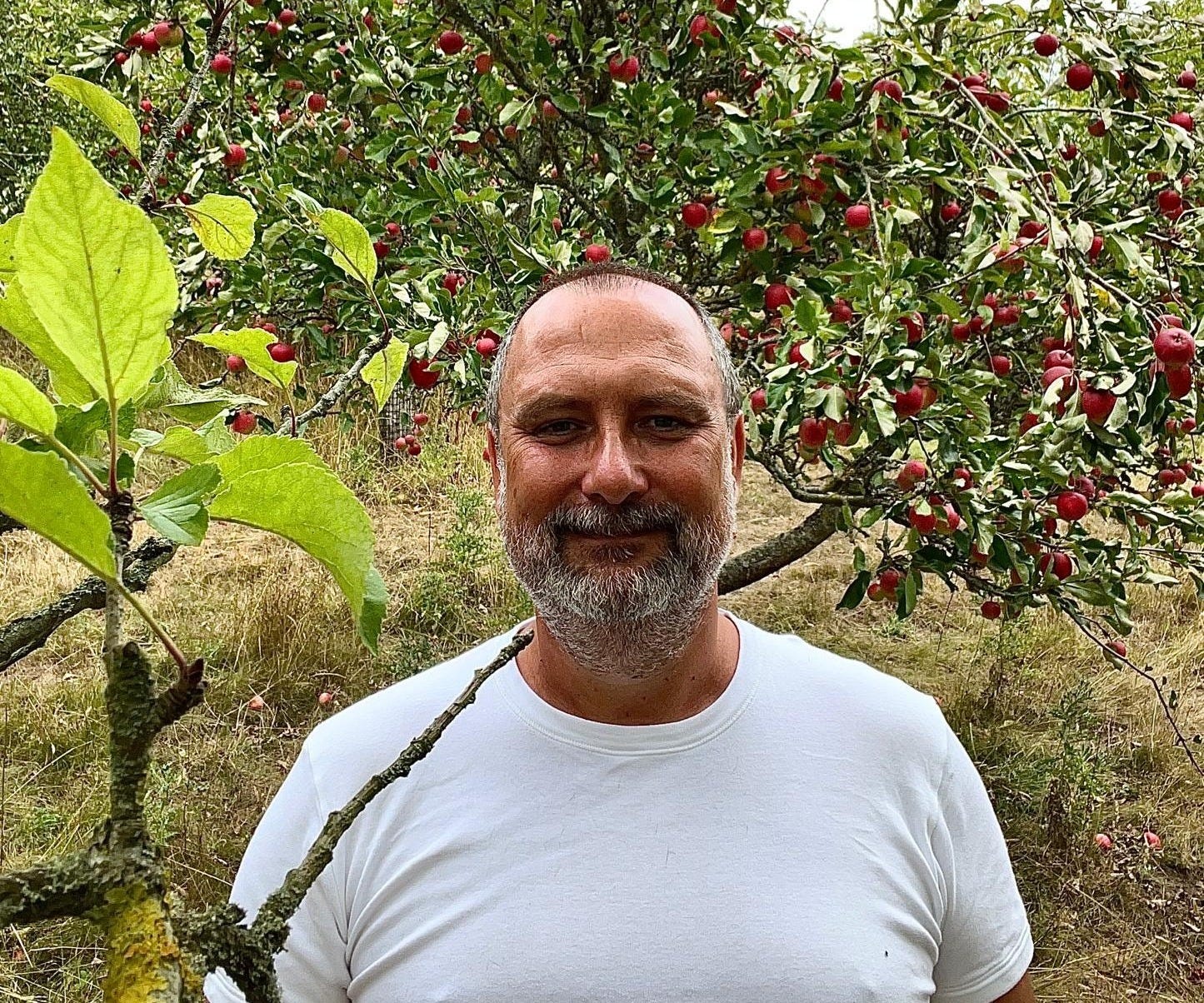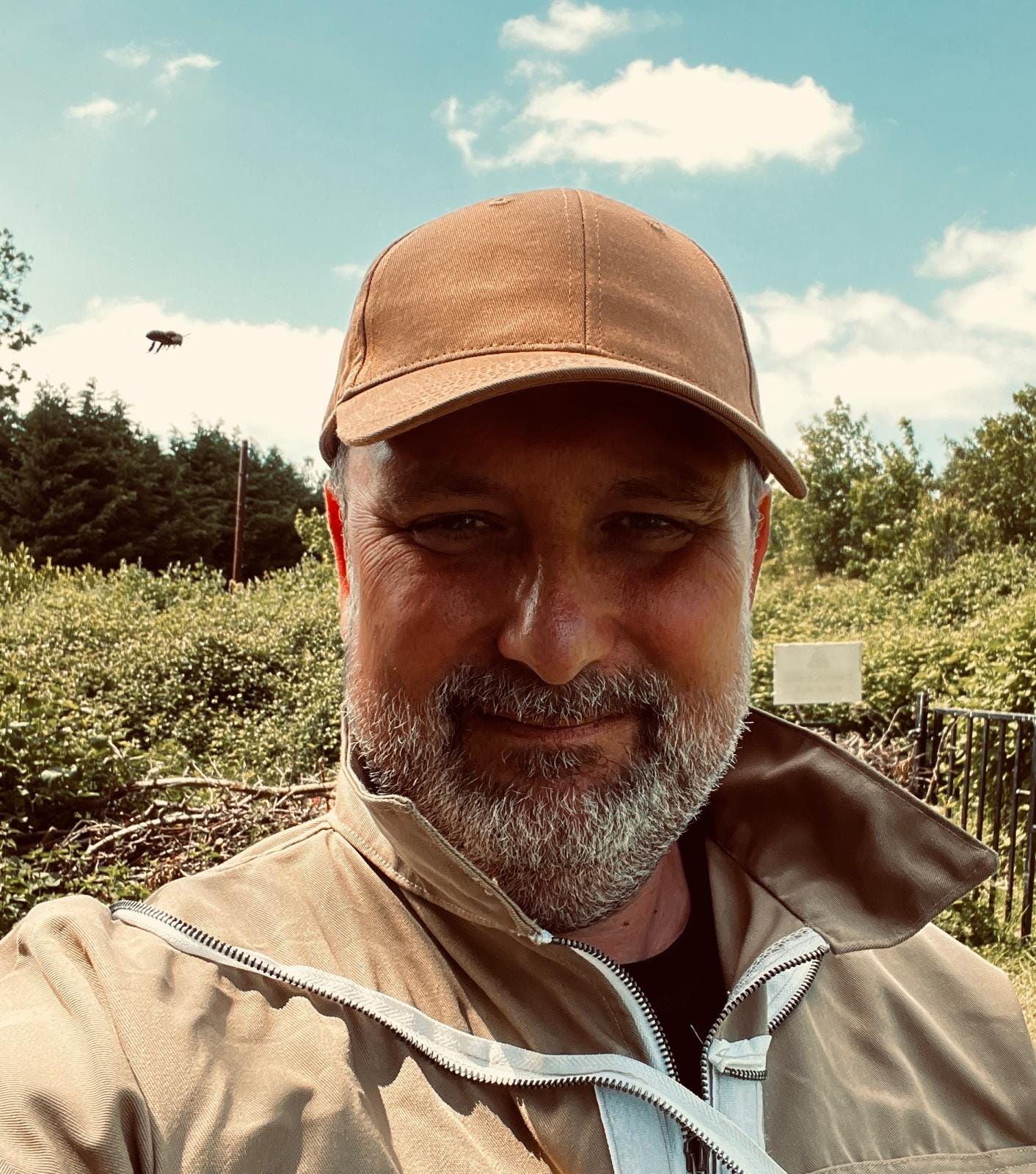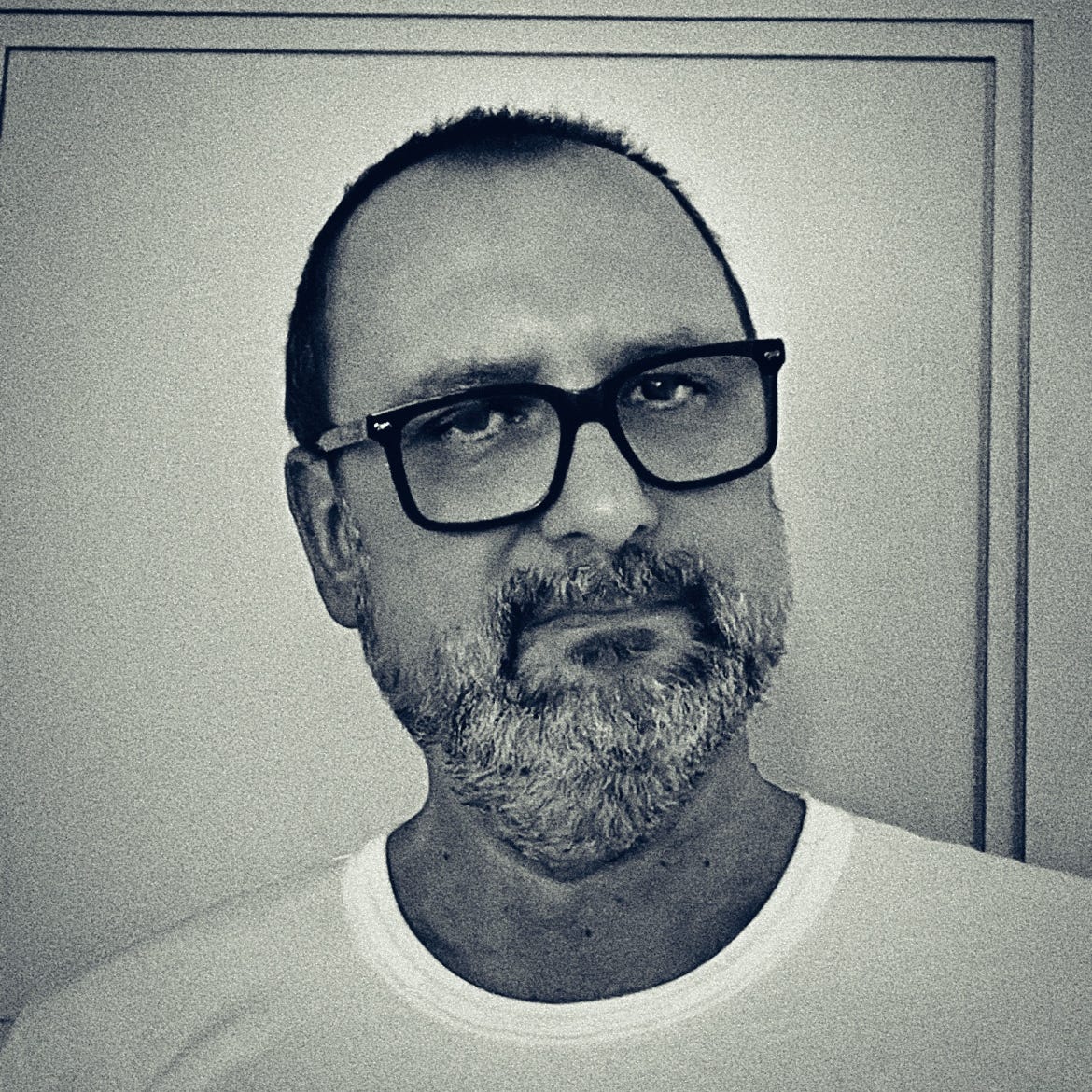"I can hear myself again here" – Will Cooper on swapping London kitchens for countryside craft
Meet the 'slow food' writer who makes his own natural ingredients, nerds out on local history, and chose curiosity instead of a Law degree
If you like to be wooed by food,
’s presence on Substack will brighten your day. His newsletter, , is a realm of sumptuous culinary inspiration, where you’re equally likely to learn about fermenting, preserving, bee-keeping, the cycle of the seasons and all the varied work of producing food on an English smallholding. A wholesome recipe, I reckon.Will abandoned a hectic career as a London chef to pursue this more meaningful role working for an ultra-high net worth family in the countryside, surrounded by pets and wildlife. His writing shares a slow, explorative immersion in the craft of food, and an appreciation for the sensuous qualities of nature’s ingredients.
Read on to discover Will’s perspectives on…
How moving to the countryside changed his relationship with his craft.
Why mudlarking and other nerdish pursuits beat studying for a law degree.
Growing produce without pesticides.
The importance of creating your own ingredients.
Curiosity, and the urge to learn traditional skills.
… and more. There’s a meditative quality about these paragraphs that makes them worth taking your time over. Enjoy!
Theo: Thanks for doing this, Will. To kick off, what drew you to your rural way of life, after working as a chef in London?
Will: After two decades of “head-down” working in the capital, it had become clear to me that it was time to move somewhere that I could take a sideways step away from the intensity of city life. I craved nature.
I grew up in the countryside, moving to London to go to University whilst still in my teens, and as the years passed by, gnawed at by a feeling that I missed the pull of nature, always finding an excuse to drive for hours on a Sunday just to sit in a field for an afternoon to look up to watch the buzzards circling high above on the wind.
Decades have passed and now that my beard has turned grey, I’m pleased that I moved away from the relentless pace of the city, the hum, the ever-present background noise, the sirens, helicopters, traffic and the light pollution. I missed the dark skies and the quiet I think, and now being able to watch how the seasons change through the smallest of details in the leaves and the hedgerows, it keeps me more inspired than before. There are wild deer here that skip by, birds of prey that circle and dance as they call way up high, quiet paths where there are only trees and long grass. I can hear myself again here and my learning has only benefitted from it.
After changing my role from Head / Exec roles in smart Mayfair restaurants to now working privately, the family that I look after moved out to the countryside, so I made the change not long after. I now live in an ancient little town on the banks of the river Thames, not far from the estate where I work.
There are pubs here that date back to the 1200s and, being a secret history nerd, that suits me fine.
Theo: Has working so closely to the land influenced the way you think about food, and the craft of preparing it?
Will: Certainly yes it has. I try to stick to the rhythm of the seasons as far as possible, and having the space to grow what we want in the large kitchen garden helps make that a reality. I pick from what I find wild around me, from the small foraging knowledge that I have.
I like to collect pollen and wild buds, fruitwood and nuts. I pick unripe hedgerow berries for fermenting, seed pods for making capers, and small leaves and wildflower heads to use in mixtures of leaves for salads. Using fruit that we grow to preserve, or plants to flavour oils, vinegar or jellies to brush onto roasted meat, stays truer to the idea that we should know more about what we eat. I use more traditional skills in my work today like cheesemaking, smoking, preserving and charcuterie making. Skills from the ‘slow food’ ethos that for me are ideal for where I am.


There are two hives of bees that I keep with some measure of success, though I’m relatively new to the skill. This is my third year of looking after them, and with only one colony loss over the years, the odd swarm, plenty of stings, frazzled nerves but an abundance of a very special wild honey. It makes me proud to be able to use it in the kitchen when you know that the girls made it in the garden. I have three containers from the last few years filled with our honey stores. Some is bright and clear, another thickly set and this year’s spring harvest has now settled and is a very pale light gold. I have left the bees to get on with their work, only helping them out when needs must. A different aspect to my work entirely.
Theo: What’s keeping you busy at the moment?
Will: I have just finished a project that took two years to complete, where we picked the apple harvest from the old orchard here, turning three quarters of a tonne of fruit into juice, reserving around two hundred or so litres of sweet cloudy apple juice to ferment into cider, then letting it change once again over time into a deep golden apple cider vinegar. I did this the slow way without forced aeration, letting the mother slowly develop in the vessels. I used the flower heads from the wild rose bushes to infuse a deep pink floral version that is very specific to the land here.


Today has been exciting as I picked the first batch of our broad beans, only noticing them quite by accident as I went to pick some red mustard leaves, only then to discover half a dozen fat purple artichokes that look ready to cut in the bush nearby. We plant a large amount of produce in the garden, without using pesticides. Jamie who grows everything here uses hydroponics to grow most of the delicate leaves and herbs, we have nearly a dozen raised beds that have all of the beans, onions, brassicas, leeks, radishes, cucumbers and artichokes to name just a small part of what we grow. Using companion planting of marigolds, nasturtium and strong herbs to deter the insects.
I would like to grow wheat here to be able to mill flour for the bread that I make, along with oats and old grains for baking. Perhaps that may work in the future.
Theo: You say you needed a break from the intensity of London, but it sounds like you’re gaining newfound creative energy from this way of life – an entrepreneurial spirit perhaps. A different kind of busy? Does it still feel like work?
Will: I decided to walk away from the restaurant world after quite honestly having felt like I had nothing more to give. It was a crossroads in my life. My day-to-day had become incredibly toxic, I was very lost and I wasn’t prepared to accept that anymore for both myself and my team, so I stepped away which was the right thing to do. I was able to refocus my time on the small family that I now work with and with my love of ingredients, I adapted my food and I redefined my working life. I spent a few years more years in the city before relocating to the countryside where I am now.
I think the universe spoke at that point and I’m incredibly grateful for that.
As someone who cooks food, the ingredients that I use have always been key to me. What I found in my work was with my skill set, I could teach myself and learn to create ingredients that often chefs buy without really thinking. Stripping back the layers of the how, where and why, I taught myself to make charcuterie, decent fennel salami, saucisson sec, pancetta, coppa and bresaola. I put my mind to recipes from the past and learned to make a cheddar from a few hundred-years-old farmhouse recipe. I became intrigued by the importance of how mould plays its part in the natural process of creating preserved food. I now play around with vinegar and currently make half a dozen types for myself using different herbs, young wood, fruit and flowers. I feel that my path has come full circle as a cook, as with all that I've learned over the years I now create the ingredients that I use, and the beauty of that is that I know what is in them and understand what’s behind the product.
This is for me the creative drive. I’d like to focus a little deeper on understanding cheese next as I can turn my hand quite successfully to making a few types, but would like to master the process. Not for any reason other than wanting to learn and to be able to do it well.
“As a private chef you need to be able to do everything well, to be all things to all people, so there is little room for error.”
When you say ‘a different kind of busy’, yes I agree. My day is still governed by small deadlines, as always in this work, though the relentless counting down minutes during service has gone. My work time is still very structured as there are points throughout the day where things need to be ready, and I’ve still never learned to stop and sit down. As a private chef you need to be able to do everything well, to be all things to all people, so there is little room for error.


There are over a dozen dogs of all shapes and sizes here that are a huge part of my life, a motley crew of the most beautiful dogs that I’ve known for many years. In addition, my little dachshund accompanies me to work most days just to make things interesting. She has had two large spinal operations in her life so has her limitations and can’t be left alone. I look after the dogs as part of the family group, make them bone broth, dry liver treats in the dehydrator, make them birthday cakes or often just sit down with them. I’m blessed, truly. And then there are eighteen cats…
Theo: (I’m a dog person too – rarely happier than when watching Alfie romping over new terrain, or feeling his warmth beside me.) Have you always had this kind of curiosity towards developing your repertoire of skills? What would your life look like today if you were a less curious person?
Will: I have always been the one to constantly ask questions. I believe I’ve inadvertently annoyed a great many people, and many great people in my pursuit of wisdom, always wanting to learn the correct way of doing things.
Taking classical French cookery as an example of learning, the foundation skills and techniques will always stand the test of time and will stand any curious cook in good stead for whatever might come their way. To be able to neatly turn an artichoke, correctly fillet a sea bass or make a perfect Béarnaise sauce or lobster bisque are hugely important skills that I would expect any good cook to be able to perform faultlessly, though they’ll cause problems for those who have only ever been shown the rushed way of doing things by someone who in turn was also shown the careless way. It’s about having the curiosity to want to learn properly.


Making charcuterie for instance is a skill that I thought important to master, a skill that I’ve taught myself as it was something that I hadn’t had the opportunity to learn in great detail before. The odd bresaola I’d made reasonably badly here and there as a young cook, so I wanted to learn in depth as I felt that I was missing something important. Many people experiment once with salami making, usually it then goes mouldy and they back off and throw it away, scared witless of the possibility of inoculating botulinum, and they never return to the cause. Understanding how nature works and the processes involved, how to avoid the pitfalls, and to learn how to prevent or address any issues as they occur is challenging.
“It is only through patience, understanding and curiosity as to the ‘why and how’ that teaches you these skills.”
It’s the same with making bread; no one begins to learn to make good bread being able to consistently turn out great loaves at the start. It is only through patience, understanding and curiosity as to the ‘why and how’ that teaches you these skills. Not being satisfied with some minor flaw in the result, no matter how insignificant, hopefully leads you to more questioning, and that only leads to more learning.
About a decade ago I told myself that I needed something new to think about and convinced myself that it would be a novel idea to take another degree, this time Law, not for any reason other than it would have been a great challenge and to try to fit it around kitchen life would have been interesting. I was accepted in principle, though it became clear that the prohibitive financial cost of the course put the dampers on my plan. (Also I suppose I wouldn’t have had any sleep for three years.) My brother also kindly pointed out to me it might perhaps be better if I took a course in accountancy or book-keeping instead, as it was at least relevant to my work if I opened a restaurant, which in hindsight I completely understand, but I hate numbers and am stubborn so I wouldn’t have listened to him anyway.
I took up mudlarking instead, spurred on by the quest for knowledge, spending quiet sunrises on the foreshore of the river alone on my knees, covered in tidal mud, looking for small pieces of history, little pieces of previous lives from centuries ago that the Thames throws up twice a day, each time the tide goes out.
And in answer to your question, I suppose if I were less curious in life, then I wouldn’t have learned to keep bees and I’d have to buy sourdough instead of making it, I wouldn’t have a head full of facts nor a nerdish interest in Medieval English churches and I’d be happy in my ignorance.
Theo: Here’s to nerdery in all its forms! 🍻 Finally, what advice would you give to someone looking to follow in your footsteps? How might they position themselves to find a similar role?
Will: Be courteous, reliable, discreet and trustworthy. And learn to cook everything. Well.
Will’s delicious Substack can be found here.
If this conversation contributed something positive to your day, here’s how you can send a tiny tip without committing to an annual subscription. For anyone who gives, thank you, thank you, thank you. 🙏
If you liked this, you’ll probably like my conversation with Ugandan coffee entrepreneur Susanna Namuli, which you can read here.
And you can read some of my thinking behind these posts here… 👇
Upcoming Conversations
Hello folks. Right now I’m lining up a series of Q&As that will feature here as part of Ways of Life. This has been in the pipeline for some time, so it’s good to finally let the project see daylight.









